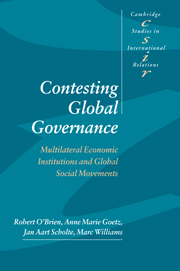Book contents
- Frontmatter
- Contents
- Preface
- List of abbreviations
- 1 Contesting global governance: multilateralism and global social movements
- 2 The World Bank and women's movements
- 3 The World Trade Organization and labour
- 4 The World Bank, the World Trade Organization and the environmental social movement
- 5 The International Monetary Fund and social movements
- 6 Complex multilateralism: MEIs and GSMs
- References
- Index
- CAMBRIDGE STUDIES IN INTERNATIONAL RELATIONS
6 - Complex multilateralism: MEIs and GSMs
Published online by Cambridge University Press: 22 September 2009
- Frontmatter
- Contents
- Preface
- List of abbreviations
- 1 Contesting global governance: multilateralism and global social movements
- 2 The World Bank and women's movements
- 3 The World Trade Organization and labour
- 4 The World Bank, the World Trade Organization and the environmental social movement
- 5 The International Monetary Fund and social movements
- 6 Complex multilateralism: MEIs and GSMs
- References
- Index
- CAMBRIDGE STUDIES IN INTERNATIONAL RELATIONS
Summary
The preceding four cases studies have shown that numerous changes have taken place in the MEI–GSM relationship over the past twenty years. This chapter provides a comparative analysis of these developments and assesses their significance for global governance. We argue that there is a transformation in the nature of governance conducted by MEIs as a result of their encounter with GSMs. This transformation is labelled ‘complex multilateralism’ in recognition of its movement away from an exclusively state based structure. At present the transformation primarily takes the form of institutional modification, although some policy innovation is occurring. Such changes explicitly acknowledge that actors other than states speak on behalf of the public interest. While signalling an alteration to the method of governance, it is less clear that there is a change either in the content of governing policies or in the broad interests they represent. In the short run the MEI–GSM nexus is unlikely to greatly transform institutional functions. In the longer run, there is the possibility of incremental change in the functioning and ambit of these key institutions depending upon the outcome of continued political conflict.
This chapter begins by outlining the basic characteristics of complex multilateralism and its relationship to other understandings of multilateralism. It then moves on to consider how the five characteristics of complex multilateralism (varied institutional modifications, rival motivations, ambiguous results, differential state implications and socialised agenda) have manifested themselves in our case studies.
- Type
- Chapter
- Information
- Contesting Global GovernanceMultilateral Economic Institutions and Global Social Movements, pp. 206 - 234Publisher: Cambridge University PressPrint publication year: 2000



